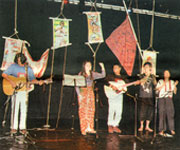
by Midori Hiraga
Published in Hongkong Standard 23 January 1996
|
Stories by Midori Hiraga |
| How I became a Third World journalist |
|
English |
| On the 50th anniversary of Hiroshima |
|
Japanese use holiday to purge guilt over the past |
|
Chinese migrant's battle to obtain degree |
|
Filipino arts group shares message of hope and justice |
|
Japanese |
| Hong Kong's handover 1997 |
|
"We are not products" -- Foreign domestic helpers in Hong Kong |
|
Life as the only Japanese reporter on an English newspaper in Hong Kong |
|
Curriculum Vitae |
|
|
BUGKOS -- Tagalog for unity -- uses music, theatre and the arts to protest against the inequities in Philippine society and to empower the oppressed.
The Philippines' refuge for concerned artists, Bugkos is a grassroots-based centre for people's art and literature.
Once a culturally diverse country with rich natural resources, the Philippines is still struggling to regain its self-esteem after the dark years of the dictatorial Marcos regime.
 Bugkos sings songs of liberation at their show at Fringe Club |
The change in government administration has not eased the people's suffering.
"The situation is getting worse," a member of Bugkos says. "In order to solve poverty, we need to fight imperialism, the feudal system and the bureaucratic capitalists."
Bugkos, established in 1988 to bring art groups together under one roof, aims to help ordinary Filipinos regain their liberty through art.
Although the government has not banned Bugkos, it does not encourage the group's activities. Bugkos and its affiliate groups perform in theatres and on streets, telling people about the struggle of the oppressed.
They aIso visit villages in the mountains and other remote areas to organize local people and teach them how to use art to express their anger at the authorities' indifference to their plight.
Last week, Bugkos brought their brand of music and art to Hong Kong. In a memorable show at the Sheung Wan Civic Centre, the group deeply impressed the audience with their play "Asdang: A People's Rising".
The play depicts the Philippines suffering many invasions -- first by priests clutching swords and rosaries. Next came a brutal eagle, then a chameleon and finally a snake -- all symbols for the different people who invaded the Philippines under the guise of saving it.
Spain colonized the country of 7,100 islands for 400 years, followed by the United States and lastly Japan -- but in the play, Bugkos showed another "invader" who made life difficult for Filipinos -- the dictator Marcos.
"There is no country in the world which was liberated so many times," the Bugkos pamphlet says.
"Spain came to the Philippines in 1521 saying it liberated local people from ignorance and idol worship.
"America came in 1898 and declared the liberation of people from Spanish occupation. The Japanese came in 1941 to liberate people from America and America came back three years later saying they liberated the people from Japanese occupation.
"From then on, we had eight elections and every president said they liberated the Filipino people."
Bugkos also performed at the Fringe Club, singing songs of liberation and freedom from suffering.
Santa Filomena is a song about a town ordered demolished by government authorities in the 1980s. It is about how the military burned the houses and destroyed the land of small farmers, and about people crying over their lost town.
Santa Filomena was among several towns erased from the Philippine map to give way to infrastructure construction that mainly served the capitalists and enforcers of the feudal system, a Bugkos member says.
In the play, Annie Ruth Calambacal sang the song for the Hong Kong audience.
A conscientious college student in the 1980s, Annie Ruth was attracted to the group by its cultural theme and its struggle against the inequities in society.
"When the police first harassed us, I knew the government was not serving the interests of the people," says Annie, a musician.
Because most of Bugkos's performances attacked the oppressive government and its policies, the group was often harassed by the police.
Bugkos executive officer Romeo Dongeto recalls an incident in which one of their colleagues was killed by soldiers for practicing the art he believed in.
"He was conducting a cultural meeting with the farmers," Mr Dongeto says. "The military tagged him as a communist and killed him."
Members say they have learned to be quick when performing in front of ordinary people in the streets. They fear the military and police intelligence agents of the kind who killed their colleague.
During their stay in Hong Kong, the group also held a three-day workshop on people's theatre for students and the public.
In the workshop, a Bugkos facilitator helped participants to express their inner feelings about any form of injustice they may be aware of.
The participants also viewed a documentary video about the people's protest movement in the Philippines.
"Some labourers don't know how to express their suffering," Yoyo Yau, a Hong Kong Polytechnic University student, said. "But after attending this workshop, I learned that Filipinos can effectively use cultural activities to protest against their government."
 Local workshop participants in a street performance after learning from Bugkos members |
At the end of the workshop, groups of five people each performed a street play at Chater Garden in Central.
Before performing, the participants discussed their chosen topic and how they would express their message.
"I did not know the theatre can really do something for people. It can be used as a tool," one participant said.
The workshop's facilitator, Ernesto Marcelo, said the effectiveness of street theatre was beyond doubt.
At the end of the discussions, one participant said they needed to learn from the experience of the Filipino cultural movement.
"After 1997 (Hong Kong's handover to China), we might experience what you are experiencing," the participant said.
Story and pictures: Midori Hiraga